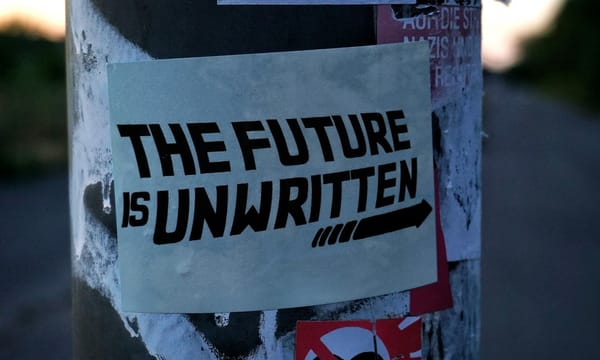Dune & How It Can Help Us Fight Authoritarianism
Beneath its world-building, Frank Herbert’s Dune series is a deconstruction of authoritarianism, religious fanaticism, and the dangers of charismatic leaders. It's a warning about how easily people fall for tyranny when it’s wrapped in the right myth. [SPOILER ALERT]

Frank Herbert’s Dune series is often seen as an epic sci-fi saga about desert warfare, spice, and giant sandworms, but beneath its world-building, it’s a brilliant deconstruction of authoritarianism, religious fanaticism, and the dangers of charismatic leaders.
Herbert didn’t just write a space opera—he wrote a warning about how easily people fall for tyranny when it’s wrapped in the right myth. The Dune series is packed with lessons on:
- The dangers of messianic leaders
- How religion can be weaponized
- Why resistance must outlast the revolution
- How power corrupts even the well-intentioned
Let’s break it down.
Beware of “Heroes” – The False Messiah Trap
“No more terrible disaster could befall your people than for them to fall into the hands of a Hero.”
The Dune series is a direct rejection of the “Chosen One” myth. Paul Atreides seems like the perfect hero—a noble-born exile, a brilliant strategist, the prophesied savior of the Fremen. But Herbert deliberately shows how Paul’s rise leads to mass death, war, and authoritarian rule.
- Paul wins, but he becomes an emperor with absolute power.
- His Fremen followers worship him like a god and launch a bloody holy war across the galaxy.
- He knows this will happen—but chooses to seize power anyway.
Why this matters today:
- Populist leaders often position themselves as “saviors.”
- People crave strong leaders in times of crisis, even when it leads to dictatorship.
- The line between liberator and tyrant is dangerously thin.
Never trust a leader who presents themselves as the only solution. Charisma does not equal righteousness.
Religion as a Tool of Control
“When religion and politics ride in the same cart, the whirlwind follows.”
The Bene Gesserit—Dune’s secretive, manipulative sisterhood—create religious myths to control populations.
- They plant false prophecies so that, one day, they can install their own leader.
- They spread belief systems designed to make people obedient.
- Paul exploits these myths to gain power, knowing full well they are fabricated.
Why this matters today:
- Religious nationalism fuels authoritarian movements.
- Many leaders exploit religious identity to justify oppressive policies.
- Myths are powerful weapons. People fight and die for them, even when they’re lies.
Question political leaders who use religion to gain power—it’s rarely about faith and almost always about control.
Power Corrupts Even Those With Good Intentions
“He who can destroy a thing has the real control of it.”
Paul starts with noble intentions to avenge his father and free the Fremen, but power slowly corrupts him.
- He claims absolute control over spice, dooming billions to scarcity.
- He kills or exiles anyone who threatens his rule.
- He knows his reign will lead to bloodshed—but does it anyway.
Why this matters today:
- History shows that revolutionary leaders often become authoritarian.
- Even well-intentioned rulers justify tyranny in the name of stability.
- Any system built around a single leader is a system doomed to collapse.
True power isn’t about ruling. It’s about ensuring no one wields absolute authority in the first place.
Resistance Must Be More Than a Revolution
“Most civilization is based on cowardice. It’s so easy to civilize by teaching cowardice.”
The Dune series shows that toppling a dictator isn’t enough—you must build something better.
- Paul overthrows the Emperor, but becomes a new one.
- The Fremen win their war, but end up as tools of imperial conquest.
- Paul tries to resist prophecy, but still leads the galaxy into chaos.
Later books (Children of Dune, God Emperor of Dune) show that authoritarianism doesn’t die easily. Paul’s son, Leto II, creates a 3,500-year dictatorship to forcibly shape humanity’s future. He believes only extreme tyranny can “save” the species.
Why this matters today:
- Revolutions without structure often lead to new forms of tyranny.
- If a movement depends on one person, it will fail.
- The true test isn’t seizing power—it’s giving it up.
A movement that can’t function without its leader is doomed to become another dictatorship.
The Myth of Stability – Why Empires Always Fall
“All governments suffer a recurring problem: Power attracts pathological personalities.”
Herbert’s Dune universe spans thousands of years, and one message is clear:
- Empires always collapse.
- The more rigid a system, the harder it falls.
- The illusion of stability leads to complacency, and complacency leads to ruin.
Why this matters today:
- No authoritarian system lasts forever, but it can do immense damage before it falls.
- Societies that refuse to adapt are vulnerable to collapse.
- The best defense against tyranny is a flexible, decentralized system.
If a system requires oppression to function, it’s already doomed to fail—what matters is whether we let it take us down with it.
The Butlerian Jihad: Controlling Technology to Control People
“Thou shalt not make a machine in the likeness of a human mind.”
The Dune series has a long history of anti-AI sentiment due to the Butlerian Jihad—a war against thinking machines. As a result, all technology is tightly controlled by an elite class.
But, this isn’t really about AI it’s about who controls knowledge.
- The Spacing Guild hoards technology to maintain its monopoly.
- The Bene Gesserit hoard genetic knowledge to manipulate bloodlines.
- The Mentats replace computers, but serve those in power.
Why this matters today:
- Access to technology = access to power.
- Surveillance technology is often used against the public, not for them.
- Controlling knowledge keeps people from challenging authority.
If only the elite control technology and information, the rest of society becomes slaves to their power.
Final Takeaways: How Dune Helps Us Fight Authoritarianism Today
Herbert didn’t just write about power, he wrote about how to recognize, resist, and dismantle it.
- Beware of charismatic leaders—heroes can become dictators.
- Question religious and political myths—they are often created to control.
- Power corrupts, even with good intentions—no one should have unchecked control.
- Revolution isn’t enough—what comes next is just as important.
- No empire lasts forever—but they cause immense harm before they fall.
- Control of knowledge = control of people—resist technological and intellectual monopolies.
Dune isn’t a guide for building empires. It’s a guide for breaking them. If we recognize the warning signs of tyranny, we have a chance to resist before it’s too late. Or, as Herbert himself put it:
“To suspect your own mortality is to know the beginning of terror. To learn irrefutably that you are mortal is to know the end of terror.”



